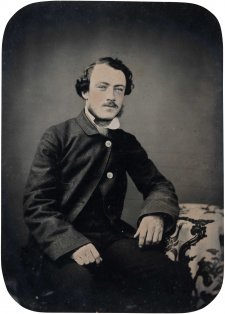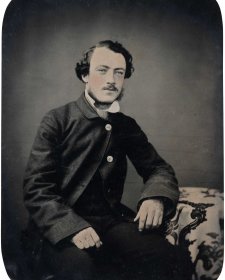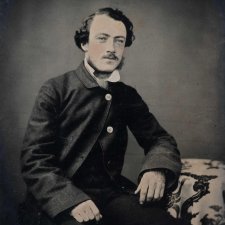Thomas Wentworth (Tom) Wills (1836–1880), is popularly thought of as the co-inventor of Australian Rules football. Born in Sydney, he was the eldest child of Horatio Spencer Howe Wills (1811–1861), a landowner who relocated from New South Wales to Port Phillip in 1839. Tom Wills received some of his school education in Melbourne before, at fourteen, being sent 'home' to Rugby, England, where he proved an adept sportsman though not much of a scholar. He then attended Cambridge but did not matriculate, once again earning greater distinction for his on-field prowess, particularly in cricket. He later played for Kent and the Marylebone Cricket Club, continuing his cricket career on returning to Victoria in late 1856. In all, between 1857 and 1876, in addition to playing for Richmond, the Melbourne Cricket Club, and several other teams, he represented Victoria in twelve matches against New South Wales, scoring a total of 319 runs and taking 72 wickets at an average of 10.23. His significance to Australian sporting history, however, arguably resides primarily in his instigating a local code of football as a means of keeping cricketers fit during winter. In 1858, Wills helped establish the Melbourne Football Club; in 1859, he led the group that set down the code of laws for what later became known as Victorian or Australian Rules football – elements of which, some historians have argued, may have their origins in marngrook, a traditional game played by the Aboriginal people of the Western District, and which Wills may have witnessed as a boy.
In 1861, Wills accompanied his father and a group of employees to Cullin-la-ringo, a property located on Gayiri country in central Queensland that Horatio had leased the previous year. In mid-October 1861, less than a fortnight after Horatio and his party had arrived, he and eighteen others were murdered in an attack mounted by a group of Aboriginal people. Tom Wills, one of only six survivors of the tragedy, is now believed to have been involved in atrocities that were committed against the Gayiri and other communities over the ensuing months in payback for the Cullin-la-ringo killings. By 1864, Wills was back in Victoria. He returned to sport, playing football for both Melbourne and Geelong, representing his state again in inter-colonial cricket, and serving in administrative capacities in both sports. In 1866, he was engaged as the captain-coach of a team of Indigenous cricketers that subsequently played a number of fixtures in Victoria and New South Wales but which disbanded prior to a planned tour to England in 1867. By the mid-1870s, the career of the so-called 'Grace of Australia' was unravelling, his performances routinely blighted by his alcoholism. In his final years, he lived at Heidelberg with his partner, Sarah Barber (whom his family never recognised). Fearful that he would harm himself, in April 1880 Sarah had Wills admitted to hospital for restraint. He absconded and died soon afterwards, having stabbed himself with a pair of scissors while in a state of delirium tremens.







